#Princetonfaculty
Explore tagged Tumblr posts
Text

Throwback Thursday: Masakazu Konishi was a professor of biology at Princeton University in the 1960s and 1970s. While at Princeton, he said, someone gave him three baby owls. Two survived to adulthood and he began raising owls. Konishi studied the auditory sense owls used to catch their prey, even in the dark. He theorized that sensing the difference in the time it took for sound waves to reach the right or left ear, as well as sensing the difference in the intensity heard in each ear, was what would help owls--and humans--determine the location of whatever caused the sound. He's shown here with one of his owls ca. 1971.
Historical Photograph Collection, Individuals Series (AC067), Box 3
#1970s#owl#bird#Throwback Thursday#TBT#biology#biologist#science#scientist#Princeton#PrincetonU#Princeton University#sound#faculty#Princetonfaculty#Masakazu Konishi
22 notes
·
View notes
Text
Michael Sugrue was popular at Princeton, too. In 1996, students started a successful petitioning campaign, "Students for Sugrue," to push for the University to renew his contract. Sugrue taught at Princeton for a total of 12 years.

21 notes
·
View notes
Text
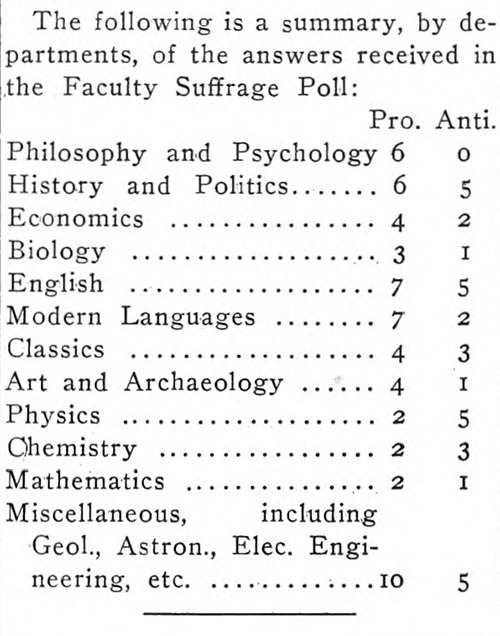
On October 15, 1915, the Daily Princetonian reported on a poll of Princeton faculty in advance of a vote on women's suffrage in New Jersey. Although philosophy and psychology faculty were unanimously in support of women having the right to vote, this was not necessarily a view shared across departments. One psychology professor explained, “the feminine type is in some respects more suited for political responsibility than the masculine type and in other respects less adapted; the two types supplement each other.” Faculty opponents to women’s suffrage expressed concern that it would be equivalent to supporting pacifism. A majority of faculty, however, said they would vote for the enfranchisement of women in New Jersey.
Women in New Jersey had actually had the right to vote from 1776 to 1807, when an "election reform" effort stripped this from them. The effort to restore their rights in 1915 failed. Women in New Jersey ultimately regained their voting rights 1920, when the 19th Amendment to the U.S. Constitution went into effect.
#1910s#New Jersey#women's suffrage#voting rights#voting#PrincetonU#Princeton University#faculty#Princeton#Princetonfaculty
34 notes
·
View notes
Text
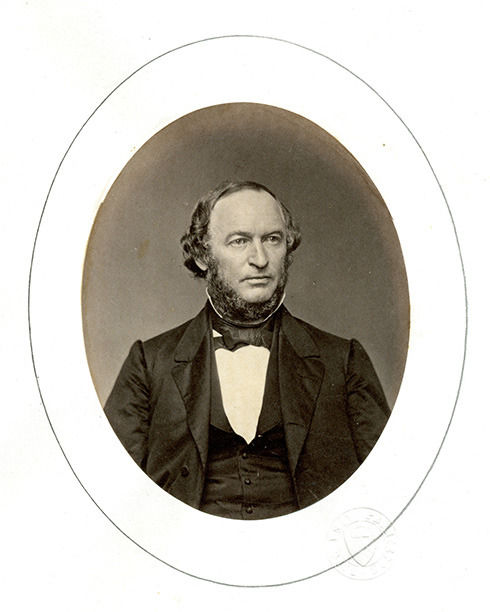
Princeton hired Joshua Hall McIlvaine, Class of 1837, to teach what was then called Political Economy in 1860. In 1869, the Board of Trustees decided to give the responsibility for teaching Political Economy to an administrator, Lyman Atwater, and assigned McIlvaine to teach Belles Lettres (English literature) over McIlvaine's protest. In 1870, McIlvaine left Princeton for a position pastoring High Street Presbyterian Church in Newark, where he served until 1887, when he founded the new Evelyn College in Princeton, New Jersey, the state's first women's college. He was its president until he died in 1897. Following his death, Evelyn closed permanently.
Historical Photograph Collection, Individuals Series (AC067), Box 136.
16 notes
·
View notes
Text

George Macloskie joined Princeton's faculty in 1874, teaching natural history until his retirement in 1906. He was trained as a theologian, not a scientist, but nonetheless kept up with scientific research. In his writings and teaching, he emphasized the harmony between science and religion. The Princeton Press wrote of the new professor in 1875, "His opening lecture has left a happy impression of his public endeavors, and we are happy to add that in ordinary social life he is pleasing. Students we believe will find in him a friend and a helper."
George Macloskie. Historical Photograph Collection, Individuals Series (AC067), Box 87.
7 notes
·
View notes
Text

George Robert Loehr, the son of missionaries, was born in China. After earning his Ph.D. in Rome, Loehr returned to China to teach at Yengching University. From March 1943 to October 1945, he was held in a Japanese internment camp in Shantung Province in China. On August 17, 1945, internees had their first contact with the outside world when American troops parachuted in. The process of liberating the camp took about two months.
Loehr later joined the Princeton University faculty as Professor of Modern Languages. He spoke English, French, German, Italian, Spanish, and two Chinese dialects.
Historical Photograph Collection, Individuals Series (AC067), Box 85
#1940s#On This Day#World War II#Princeton#Weixian Internment Camp#China#Japan#faculty#Princetonfaculty#PrincetonU#Princeton University
14 notes
·
View notes
Text
"The best way, he said, for you to preserve the Union, was to obtain a good sound education. You will be needed after the war."
--New York Times, September 2, 1862, on a Princeton professor speaking to impassioned students on the day the Union Army suffered defeat at the Second Battle of Bull Run, August 30, 1862
#On This Day#1860s#Civil War#Princeton#quote#Princetonquote#Second Battle of Bull Run#education#faculty#Princetonfaculty
6 notes
·
View notes
Text

Throwback Thursday: French professor Frank Critchlow with his daughter on Princeton University's campus, 1922.
Historical Photograph Collection, Individuals Series (AC067), Box 50
#1920s#ThrowbackThursday#TBT#Frank Critchlow#faculty#baby#baby buggy#stroller#Princeton#PrincetonU#Princeton University#Princetonfaculty
11 notes
·
View notes
Text
"While I appreciate the confidence you have shown me in 'wishing' the vice-presidency upon me, I should feel even more complimented had you chosen some other party. 'The American Peace Party' must be very 'newly formed', for my most earnest efforts have failed to discover its existence."
--Princeton professor George B. McClellan, in response to rumors that he was running for Vice President alongside Henry Ford for President, in the Daily Princetonian, May 24, 1916
#election#Vice President#candidate#Henry Ford#1910s#Princeton#PrincetonU#Princeton University#faculty#Princetonfaculty#George B. McClellan#quote#Princetonquote#On This Day
3 notes
·
View notes
Text
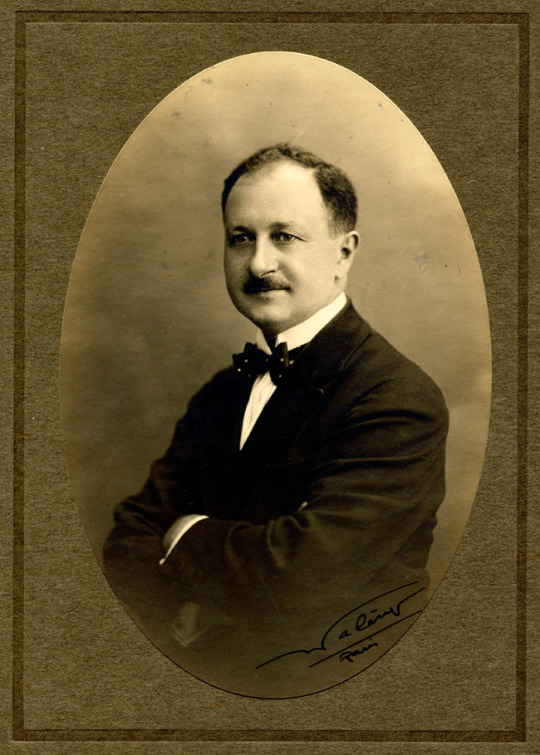
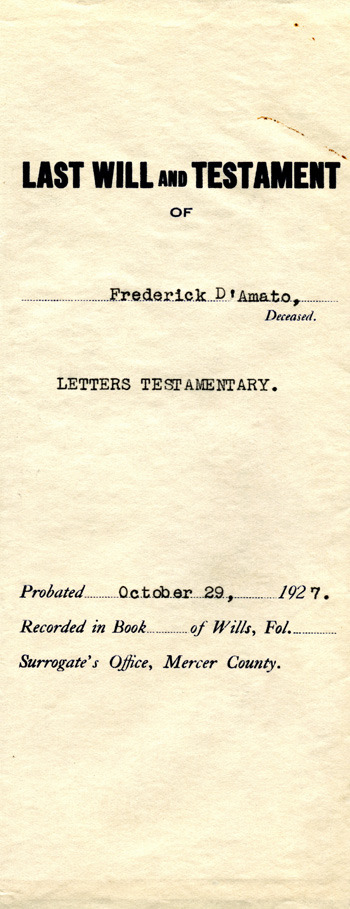
On September 26, 1927, Frederick D’Amato, Princeton University professor of architecture, made out a will while at sea just before an emergency appendectomy, which he did not survive. The will left all of his personal belongings in the United States to Princeton University, save six paintings to be given to the family of attorney Martin Colie in East Orange, New Jersey. His property in Europe was left to his father and brother in Italy.
Images:
Frederick "Frank" D'Amato, ca. 1920s. Historical Photograph Collection, Individuals Series (AC067), Box 50.
Will of Frederick D'Amato. Faculty and Professional Staff Files (AC107), Box 123.
4 notes
·
View notes
Text
“It came to me as just a complete and total surprise. … All of this went on without any knowledge on my part.”
--John G. Gager, a professor in the religion department at Princeton University, in response to the news that he'd been granted tenure when he did not know he was being considered for it, as quoted in the Daily Princetonian, April 9, 1975
#1970s#Princeton#PrincetonU#Princeton University#religion#John G. Gager#tenure#faculty#PrincetonFaculty#quote#Princetonquote
1 note
·
View note
Photo




George Musgrave Giger, Princeton Class of 1841, may have been the most artistic keeper of the institution’s faculty minutes! Giger’s doodles would stand up to any bullet journal in this century. Though the tradition of decorative faculty minutes hasn’t continued, Giger lives on in our memory; the professorate he endowed upon his death is now held by Denis Feeney (Giger Professor of Latin).
To see more of Giger’s artistic minute-keeping, see the Office of the Dean of the Faculty Records (AC118), Vol. 5 (which has been digitized).
#1840s#1850s#George Musgrave Giger#Class of 1841#Princeton#doodles#minutes#Princetonarts#College of New Jersey#faculty#PrincetonFaculty#endowments#endowed professor#endowed chair#Denis Feeney
28 notes
·
View notes
Photo
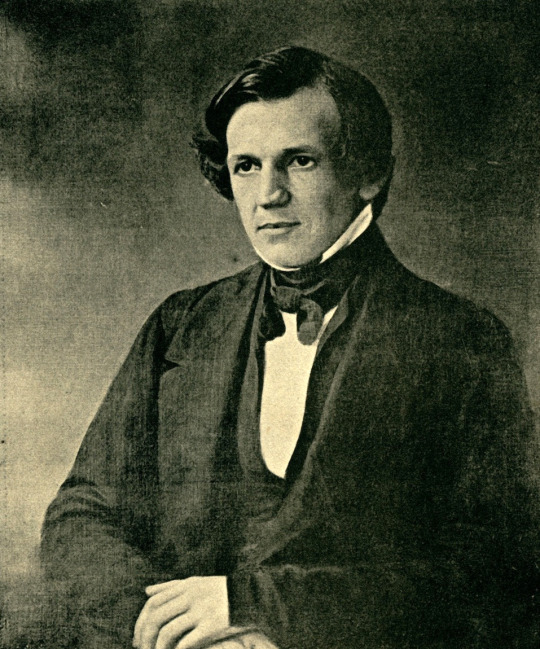
Albert Dod, Class of 1822, was a popular professor of mathematics at Princeton when he died suddenly on November 20, 1845 at the age of 40. He is also the last recorded professor at Princeton to have owned slaves.
6 notes
·
View notes
Photo

Princeton University chemistry professor John Turkevich, ca. 1950s. @princetonchem, can you tell us more about what Turkevich is doing here?
Historical Photograph Collection, Individuals Series (AC067), Box 121.
#1950s#Princeton#chemistry#chemist#science#scientist#John Turkevich#lab#laboratory#test tubes#professor#faculty#Princetonfaculty
108 notes
·
View notes
Photo
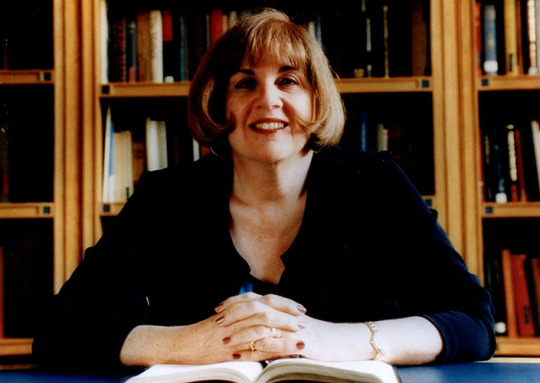
Elaine Showalter, shown here ca. 1990s, is well respected today in academia, but didn’t always feel respected at Princeton. She joined the Princeton University faculty in 1984, but she had first moved to Princeton because of her husband’s job (English Showalter was then an assistant professor of romance languages). For the first part of her own career, Elaine Showalter taught at Douglass College (a women’s college affiliated with Rutgers University). In the 1970s, she and other faculty wives agitated for changes in Princeton’s attitudes toward women as members of the local chapter of the National Organization for Women (NOW), pushing to be accepted as scholars in their own right.
Historical Photograph Collection, Individuals Series 9 (AC067), Box 17.
#1990s#1980s#1970s#Elaine Showalter#Princeton#PrincetonU#Princeton University#PrincetonWomen#Women at Princeton#faculty#Princetonfaculty#English Showalter#professor#women's rights
6 notes
·
View notes
Quote
Donors may sometimes be exacting, but at length they die, while the Legislature goes on forever.
Princeton University professor William Fite, on the pitfalls of public colleges and universities, in the September 9, 1915 edition of The Nation
#1910s#Princeton#donors#public colleges#public universities#legislature#PrincetonU#Princeton University#faculty#quote#Princetonfaculty#Princetonquote
5 notes
·
View notes